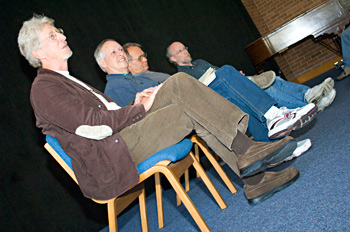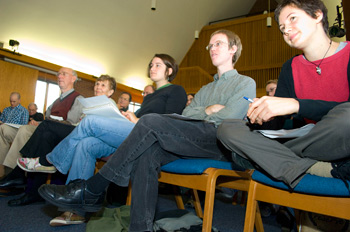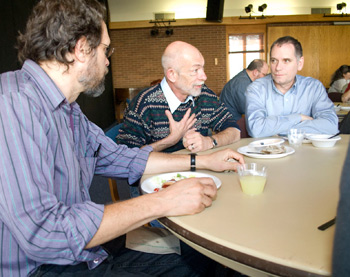Mennonite peacemakers across generations gather to discuss resistance – then and now

It was the height of the Vietnam War and the U.S. military draft; Woodstock was taking place in New York; and it was also a turning point for the Mennonite peace witness. The year was 1969.
In a historic gathering of the biennial Mennonite General Conference delegate session at Turner, Ore., in August 1969, a small group of college students called on the delegate body to recognize draft resistance – in addition to the historic peace position of nonresistance – as a valid and faithful peace witness. And they did, somewhat to the students’ surprise.
The group of resisters who brought that concern to the conference was led by three Goshen College students – Doug Baker of Goshen, J.D. Leu of Brunswick, Md., and Jon Lind of Manassas, Va. The delegates were initially suspicious of the students because of their appearance, but the group – mostly long-haired, scruffy college students who had been staying in an improvised tent colony on the edge of the conference grounds – engaged in serious conversation with church leaders and shared how they connected their actions with being followers of Jesus.
“We thought there would be a lot of opposition,” said Leu. “As things unfolded, … it was interesting that the primary concern was that we could show this position was consistent with biblical teaching and with tradition. This made it much easier to come to common ground and a decision there. … It really felt like the Spirit was leading, the way things meshed despite our differences.”

Forty years later, those three leaders along with others who also resisted the draft or who supported draft resisters gathered on Nov. 13 and 14 at Goshen College for a reunion and an intergenerational conference: “Resistance: Taking a stand against war, 1960s to today.” More than 50 people attended the conference – a third of which were students – planned by current Goshen College seniors Daniel Foxvog of Tiskilwa, Ill., Hannah D. Miller of Scottdale, Pa., and Annali Smucker of Akron, Pa.; Professor Emeritus of Religion J.R. Burkholder; and faculty members Joe Liechty, associate professor of peace, justice and conflict studies, and Tamara Shantz, assistant campus minister.
At the conference, Perry Bush, Bluffton University professor of history and author of Two Kingdoms, Two Loyalties, offered the historical context leading up to the Turner, Ore., event, describing Civilian Public Service (CPS) as an alternative to war for conscientious objectors during World War II, which was funded and administered entirely by the Historic Peace Churches. This was in contrast to the imprisonment and persecution of conscientious objectors during World War I for refusing to serve in the military.
Bush went on to describe the creation of the I-W program, a post World War II alternative service program that was in place through the Vietnam War, which addressed some of the concerns of those who “thought we compromised too much” with the CPS program. In this new system, the government paid and administered the program, though it was seen as problematic by some who thought it “essentially silenced protest to war.”
As the Vietnam War and the draft escalated, it also led to the escalation of the peace movement in the United States, which included the involvement of Mennonite young adults. Among those, there were a number who considered I-W “too safe and sound while so many draftees were dying.” They wanted to resist the draft as a response, but the (old) Mennonite Church didn’t support that as a legitimate witness. That’s why these hippie college students boarded trains and hitchhiked to Turner, Ore.
“There was a sense of urgency and sense one needed to do something,” said Glenn Conrad, a conference attendee from Columbia, Md., who was among those who went to Turner.
Leu added, “We were calling the church to be what it wanted to be.”
But why was the statement that came out of the delegate session at Turner important? Bush said, “In effect, Mennonites had cut a deal with the state. ‘You go to war, but we are people of peace. As long as you leave us alone, we won’t cause any problems.’ Essentially this statement meant that the Mennonite Church broke that deal.”
The 1969 church statement included both of the following points: “We recognize the validity of noncooperation as a legitimate witness” and “We continue to support church-related alternate service as a legitimate option for those who do not feel called to a position of noncooperation.”
What was considered extreme actions by many at the time – draft resistance – were taken very seriously and with much deliberation by the students. Lind had spent time in Hong Kong and then Vietnam with Mennonite Central Committee doing refugee relief work. “It was the crucible for getting me into draft resistance later. … I felt like I was caught in the machine,” Lind said, as he was providing relief for people devastated by the actions of his own government.
While Baker was in college, “the things I heard about that were happening in Vietnam were so personally distressing to me,” he said. “On a matter of conscience, I didn’t feel like I could go along with it at all and that someone had to appeal to the government on behalf of the people dying over there.
“But [draft resistance] was not very costly for me,” he added, as he wasn’t arrested and didn’t spend time in prison.
Others did though. Two draft resister participants at the conference that didn’t go to Turner were Duane Shank of Washington, D.C., and Dennis Koehn, of Chicago. Shank was attending Eastern Mennonite College (now University) in 1969 when he didn’t register for the draft. He was then arrested on campus by the FBI, charged with a crime, convicted and sentenced to three years probation working at community organizing. “Conscription was part of the war system,” Shank said. “For me, if I didn’t want to participate in war, I also had to not cooperate with the draft. It wasn’t just about staying personally pure, but also about being a Christian witness to the state of being opposed to war in entirety.”

Shank has worked with the peace movement since, including in his work now at Sojourners where he is the senior policy adviser.
After Koehn publicly refused to register for the draft, he was investigated by the FBI and was then arrested on the Bethel College campus in Kansas. He spent a year and a half in prison. Last year, for the first time, he was able to visit Vietnam when his daughter was there doing service through Mennonite Central Committee.
These new models of Mennonite peacemaking were helpful for André Gingerich Stoner, pastor of Kern Road Mennonite Church in South Bend, Ind., when he became a college student and faced the reinstatement of the draft in 1980. He and his peers read the stories of the earlier draft resisters. “I thank you for your witness,” he said. “We were very much challenged, shaped, inspired by your witness.”
The idea for the gathering was hatched by Goshen College Professor Emeritus of Religion J.R. Burkholder who has recently been organizing his collection of documents from the Vietnam era and recalled the intensity of discussion and emotion among young men facing crucial decisions about the draft. As a teacher of ethics and peace studies, he was a primary supporter of the young men when they were in college. “I am gratified that my brainstorm to reflect on what happened 40 years ago has born fruit more than I could have imagined,” Burkholder said.
After listening to stories and learnings from the 1969 draft resisters and specifically the experience at Turner, Ore., the conference moved to the implications for the present Mennonite peace witness. Several of the panelists had suggestions for Mennonites today. Baker said, “Look around you. Whatever breaks your heart, get involved with it. … Never be afraid to stand up to the government. But the starting point isn’t looking to stand against government.”
Koehn added, “Our highest calling today as Mennonites is to go live with the enemy and report back what is really going on, what the world looks like from the ground.”
Annali Smucker, a Goshen College student, got involved in the conference planning and attended because she “hoped for generational sharing, how history repeats itself and how it is applicable to us today.”
The conference included three workshops about what a faithful peace witness might include today when there is no military draft. One was on war tax resistance led by Al Meyer, another on counter military recruitment led by Wendell Wiebe-Powell and one about working with members of the military by Gingerich Stoner.
Shank offered final remarks to conclude the day of reflecting and thinking about the future of the Mennonite church in relation to war and peace. “This reminded me of how the relationship between the church and state – especially around war – has been defining for Mennonites in 20th century,” he said. “How do we relate to the war and war system absent a draft? A significant piece of draft resistance movement was a call to the church to live up to what it had professed.”
He noted how the response to the Vietnam War shifted Mennonites’ views on peacemaking, and that a number of programs that developed afterward were a result, such as Christian Peacemaker Teams, peace studies programs at the colleges and the Peace and Justice Support Network.
Forty years later, with ample time for reflection and chances to see the ramifications for today’s peace witness, the 1969 draft resisters have very few regrets about going to Turner. “It felt good all the way,” Lind said. “It looks even better looking back.”
But the final word on the conference was about the future rather than the past. “It is important once again to call the church to be a peace church. A Christian peace witness is a Mennonite gift to the wider church. If we lose that, the entire church is hurt,” Shank said.
– by Jodi H. Beyeler
Editors: For more information about this release, to arrange an interview or request a photo, contact Goshen College News Bureau Director Jodi H. Beyeler at (574) 535-7572 or jodihb@goshen.edu.
###
Goshen College, established in 1894, is a residential Christian liberal arts college rooted in the Anabaptist-Mennonite tradition. The college’s Christ-centered core values – passionate learning, global citizenship, compassionate peacemaking and servant-leadership – prepare students as leaders for the church and world. Recognized for its unique Study-Service Term program, Goshen has earned citations of excellence in Barron’s Best Buys in Education, “Colleges of Distinction,” “Making a Difference College Guide” and U.S. News & World Report’s “America’s Best Colleges” edition, which named Goshen a “least debt college.” Visit www.goshen.edu.




